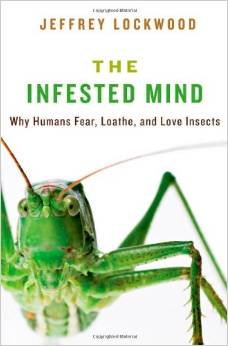Never Bitten, Quite Shy—Why Are People Arachnophobic?
A few more people have torched their houses in pursuit of a spider. First this guy in Seattle used a can of spray paint and a lighter. Then another man, this time in Wales, tried the same thing. A woman in Kansas, not to be outdone, scattered burning towels—burning towels—all round the place in her attempts at arachnicide. (She, at least, was arrested on suspicion of arson because the other half of her duplex was occupied. Not by spiders—by people.)
I don’t know what causes people to be terrified of spiders, and I don’t think anybody else does either. Not yet. Look into arachnophobia research (there’s a lot) and it runs the gamut from plausible to puzzling.
What’s also puzzling is how rarely people acknowledge that arachnophobia is not just irrational but also seriously dangerous. Not just for firebugs (see above). For people who let go of the steering wheel when a spider strolls across the dashboard (and who then endanger other drivers’ lives too). For people whose flailing, crippling anxiety makes them climb out of windows. Or swing baseball bats in the house, slam their fists into drywall, shriek and panic in public places.
Some forms of therapy are said to work. And there’s a carnival of potential explanations for the fear’s origin. You should know that . . .
1. Entomologists (scientists who study insects) are sometimes arachnophobic themselves. Shouldn’t they know better? Answer: sometimes they do, and sometimes they’re just maggot-lovers.

Great book! I intend to review it soon. Suffice it to say you’ll never look at a lubber grasshopper the same way again. Or maybe a spider. This book is a great short introduction to insect- and spider-fear. Bonus: none of the photos will make you scream or even say ick.
2. Some researchers say arachnophobia happens because people find spiders disgusting. Disgust is triggered by the dread of contamination: dirt, disease, putrescence, feces, etc. But that’s no answer at all. Why would phobics think spiders are disgusting? They don’t cause disease, are no dirtier than most other animals, and have nothing to do with rot and excrement.
3. Other researchers think it’s because the potential for spider fear is evolutionarily handy. As in, if you’re primed to acquire arachnophobia, it will protect you against spider-like threats to your existence. Again, though . . . why? What threats are those? Spiders are overwhelmingly benign in human existence, and what evidence is there that things were ever otherwise? If you’re primed to be terrified of heights, that’s smart! Falling from a great height kills you. But arachnophobia is by and large a burden, not a tool. Given the hysterical reactions people have to spiders, arachnophobia makes you worse off in daily life, not better.
4. There’s that thing called “otherness.” Too many eyes, too many legs, too hairy, they skitter. Yeah, maybe.
5. People don’t like sudden movements. Spiders move unpredictably and pop up where you don’t expect them. Many prowl around and are suddenly just there. Some move super fast as they dive for cover inside your home. So they startle you and they’re weird and you don’t know where they went.
6. Spiders bite. But bees, wasps, hornets, ants, and flies also bite or sting, and all of them are much, much more likely to bump into people. Besides, most spiders don’t bite. If you were asleep and didn’t see what caused your itchy bump, you can’t blame a spider.
7. This part is actually true: women are far more prone to fear of spiders than men are. It’s still no excuse for a thousand blogs squealing about how the author had to round up a manly man to squish a spider in the tub—that’s just lazy. Why doesn’t anybody question the sexist undercurrent: that ours is a world of dainty, timid gals and spider-dismembering strongmen? C’mon, cavewomen. I bet your genes could tell a much more interesting tale.
The roots of arachnophobia could be buried a long time yet, but meantime let’s point out a couple of things. One, you can get over a fear of spiders. Lots of people have. I was never actually afraid of spiders, but I used to carry around the usual vague dread about them, mostly fear of being bitten. Gardeners know what happens next; they have this kind of revelation all the time: once they fit themselves more calmly into the web of life, they start to salute its other inhabitants and stop fearing them. Maybe people should just spend more time outdoors, turning stuff over.
Also: people with debilitating arachnophobia should get help. We feel tickled and smug to read about some doofus burning down his laundry room to kill a spider (stories like that are also cheap clickbait for sham news sites or plagiarizing bloggers). Or freaking out on camera when spotting a spider, or (oh my, this happens a lot) crashing the car when a spider appears. But I don’t want those people on the roads, or working around machinery or open flames or my kids, and I bet you don’t either. I also don’t want them to suffer.
I read an interesting theory about love for animals, a love that arrived rather recently among our species. People acknowledge that animals feel pain, have their own interests, and possess at least a qualified right to live. This didn’t used to be. It’s among the things that make modern people modern. It’s also, according to one school of thought, something humans actually need in order to be humane toward each other.
I have no idea if biophilia holds water or if it’s just an excuse for philosophers to mud-wrestle. But I do know that once you give spiritual space to your first unlovely living creature, be it a mutt or a yard possum or a baby, compassion only grows.